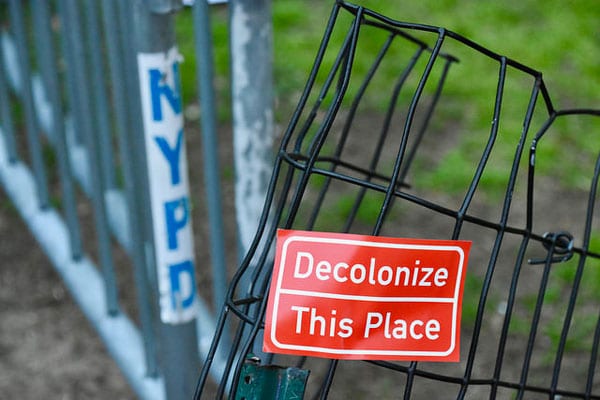
December 3, 2018; Hyperallergic and ArtNet News
Stakeholder relationships are changing for museums. NPQ has covered how institutions from New Orleans to Houston are reimagining how they show up in their communities and even who their communities are. A Smithsonian institution engaged in curating the present when it displayed symbolic objects from ongoing protests. After decades of almost universally white leadership, some museums have made serious efforts to develop strategic plans to develop more diverse staff and boards. The things that have historically put museums on the proverbial map—huge collections, grand buildings, famous names—are losing ground to audience engagement, innovative displays, and community representation.
There is one particularly prominent way in which museums are still far behind where they could be, and that is in facing their colonial pasts and the large parts of their collections that were stolen from communities of color. This week, several protests at different institutions signaled the decreasing levels of tolerance for behavior that does not acknowledge the debt museums owe to those communities.
In New York, a group called #DecolonizeThisPlace went to the Brooklyn Museum to protest and draw attention to the works acquired through imperial plunder. They wrote, “We are sharing our experiences about blurring the lines between art, activism and how we live.” DTP has been to the Brooklyn museum before, most recently to protest the hiring of a white woman to curate the African art collection. The museum’s security shepherded them out of the building, saying, “This is completely not related to what we have here,” but DPT handed out flyers, took photos, and made their message known.
In Rhode Island, students, faculty, and family members protested at the Rhode Island School of Design (RISD) to demand that a bronze sculpture from the Kingdom of Benin be returned. Virginia Thomas, a PhD candidate at Brown, introduced the action by declaring that the RISD Museum “must account for the ways in which the institution, and we as community members, continue to benefit from the dispossession of Mosshassuck from Indigenous peoples.” The museum said it is already in talks with the government in Benin to return the statue, one of hundreds of artifacts looted during the Punitive Expedition of 1897 that are collectively known as the “Benin Bronze.”
Sign up for our free newsletters
Subscribe to NPQ's newsletters to have our top stories delivered directly to your inbox.
By signing up, you agree to our privacy policy and terms of use, and to receive messages from NPQ and our partners.
Benin joined other African nations in responding to a report commissioned by French president Emmanuel Macron that recommended returning any objects looted from colonized countries upon their request. Jean-Jacques Aillagon, who was minister of culture under President Jacques Chirac, said that to follow the recommendations would “in effect empty the African collections of French museums.” That might indeed be the case, but if so, it is on museums to wonder why they never bothered to acquire art from Africa in a way that respected the labor and beliefs of the culture from whence it came. Senegal’s culture minister, Abdou Latif Coulibaly, said, “We are ready to find solutions with France, but if 10,000 pieces are identified in the collections, we are asking for all 10,000.”
Back in the US, the Whitney Museum also came under scrutiny for its relationship to communities of color. Hyperallergic reporter Jasmine Weber revealed that Whitney museum vice chairman Warren B. Kanders owns a company called Safariland, which manufactures the tear gas canisters that were launched at asylum seekers at the San Ysidro border last week. More than 100 staff members signed a letter of protest, which read,
This recently aired knowledge about Mr. Kanders’ business is demonstrative of the systemic injustice at the forefront of the Whitney’s ongoing struggle to attract and retain a diverse staff and audience…We cannot claim to serve these communities [of color] while accepting funding from individuals whose actions are at odds with that mission [of equity and representation].
Museum director Alan Weinberg responded by saying that museums were “a safe space for unsafe art”—but of course, in this case, the art is not the point. Weinberg argued out that the museum has “present[ed] progressive and challenging artists,” as if presenting progressive artists—something the museum should be doing as a matter of course—somehow balances the moral scales against profiting from the violence perpetrated on people of color at the border, some of whom are fleeing situations created by the same imperialistic dynamic that also permitted the looting of artifacts for museum collections.
It has been widely acknowledged that, as NPQ predicted, community groups have risen in strength and prominence and issues of racial justice increasingly pervade the everyday conversation of white Americans in 2018. These various movements to decolonize museums and repatriate objects are a visual metaphor for dismantling white supremacy as a whole: in order to achieve justice, the privileged party must give something up. Notions of “possession” and “public good” that museums use to defend their collections are themselves artifacts of white culture that have been used to harm communities of color, and stand ready for dismantling as much as the physical collections.—Erin Rubin













